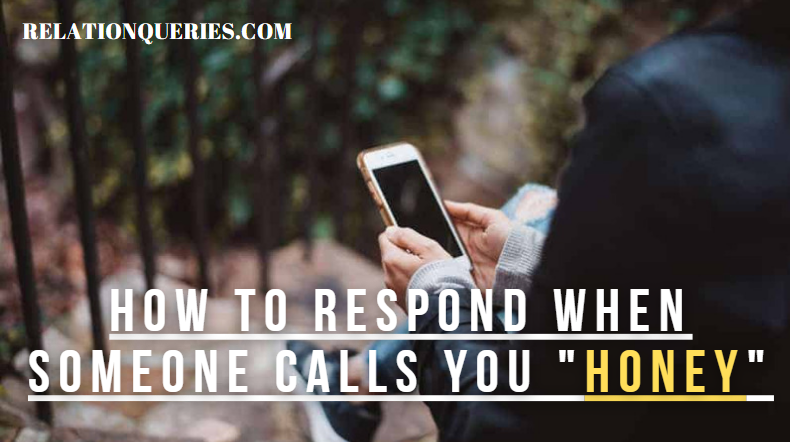
How To Respond When Someone Calls You “Honey”:- When someone addresses you with terms of endearment like “honey,” it can elicit various emotions and reactions.
While some people might appreciate the sweetness behind it, others might feel uncomfortable or dismissive.
How you respond to such a situation depends on factors such as context, relationship dynamics, and personal boundaries.
In this article, we will explore thirty different ways to respond when someone calls you “honey,” providing you with a range of options that are positive, playful, assertive, polite, or redirect the conversation.
Remember, each response should be tailored to the situation and your comfort level.
Understand When The Term “Honey” Was Used
Before crafting your response, take a moment to understand the context in which the term “honey” was used.
Consider the person’s tone, body language, and your existing relationship with them.
This understanding will help you choose the most appropriate response and avoid any misunderstandings.
28 Ways To Respond When Someone Calls You “Honey”
Positive Responses
1. Acknowledging the Term of Endearment:
Respond with a smile and a friendly demeanor, acknowledging the person’s intention behind using the term “honey.” For example, you could say, “Thank you for the sweet nickname!”
2. Responding with a Compliment:
Return the favor by complimenting the person who called you “honey.” For instance, you could reply, “You always know how to make me feel special, too!”
3. Embracing the Sweetness:
Embrace the affectionate gesture by responding positively. Show your appreciation and warmth by saying, “It’s always nice to be called something sweet like ‘honey.'”
Playful and Humorous Responses
4. Light-hearted Comebacks:
Playfully respond with a light-hearted comeback to maintain a friendly atmosphere. For example, you could say, “Well, as long as I’m not sticky or attracting bees, I’m good!”
5. Witty Retorts:
Respond with a witty remark that lightens the mood and shows your quick thinking. For instance, you could reply with a twinkle in your eye, “Ah, honey, you know how to make me feel like a queen bee!”
6. Sarcastic Replies:
Use sarcasm to respond in a humorous and lighthearted way. For example, you could say, “Oh, honey, I’ve been called worse. You’re not even close!”
Assertive Responses
7. Expressing Personal Preference:
Share your preference for a different nickname in a respectful yet assertive manner. For instance, you could say, “I appreciate the sentiment, but I prefer if you call me by my name.”
8. Requesting a Different Nickname:
Politely ask the person to use a different nickname that you find more comfortable. For example, you could say, “Would you mind calling me by my nickname, [insert preferred nickname], instead?”
By reading all these 28 responses, you will definetly know How To Respond When Someone Calls You “Honey”
Polite and Respectful Responses
9. Thanking for the Compliment:
Show gratitude for the compliment embedded in the term “honey.” Respond with sincerity by saying, “Thank you for the kind words. It means a lot to me.”
10. Responding with Kindness:
Respond with kindness and warmth, reflecting the positive intentions behind the term. For instance, you could reply, “You always know how to brighten my day with your kind words, honey.”
11. Using Polite Deflection:
Politely deflect the term by redirecting the conversation to a different topic. For example, you could say, “Speaking of sweetness, have you tried that new bakery in town?”
If you wanna know about What Does It Mean When A Girl Calls You Dude, Buddy, Or Man then visit here.
Redirecting the Conversation
12. Shifting the Topic:
Divert the conversation to a different subject to move away from the nickname. For instance, you could say, “By the way, have you seen the latest episode of that TV show we both love?”
13. Asking about the Speaker:
Redirect the focus by asking the person about themselves. For example, you could say, “So, honey, how’s your day been? Anything exciting happening?”
14. Engaging in a Different Conversation:
Change the topic altogether to steer the conversation away from the term “honey.” For instance, you could say, “You know what? I’ve been meaning to ask you about your recent trip. Tell me all about it!”
Disregarding the Term
15. Ignoring the Nickname:
Carry on with the conversation without acknowledging the term “honey.” This approach is suitable when you prefer not to address it directly.
16. Continuing the Conversation:
Respond to the person’s statement or question without dwelling on the nickname. Keep the conversation flowing smoothly and naturally.
Personal Boundaries
17. Setting Boundaries Politely:
If the term “honey” makes you uncomfortable, set personal boundaries by expressing your feelings politely. For example, you could say, “I’d prefer if you don’t use endearing terms like ‘honey.’ It’s just a personal preference.”
18. Expressing Discomfort:
If you feel uneasy with the nickname, communicate your discomfort respectfully. For instance, you could say, “I understand it’s meant affectionately, but I’m not really a fan of being called ‘honey.'”
Cultural and Regional Considerations
19. Understanding Cultural Differences:
Recognize that cultural norms vary, and terms of endearment might be more common in some cultures. Show respect and adapt your response accordingly.
20. Respecting Regional Norms:
In certain regions, terms like “honey” may be used casually without any romantic connotation. Be mindful of regional norms when choosing your response.
Responding to Unwanted Advances
21. Assertively Rejecting Advances:
If the term “honey” is accompanied by unwanted advances, respond assertively to make your boundaries clear.
Firmly say, “I appreciate your intention, but I’m uncomfortable with that kind of nickname or any advances. Let’s keep our interaction friendly and respectful.”
22. Seeking Support if Necessary:
If the situation escalates or persists, don’t hesitate to seek support from trusted friends, colleagues, or authorities. It’s important to prioritize your safety and well-being.
Maintaining Professionalism
23. Responding Appropriately in Professional Settings:
In professional settings, maintain a professional tone and redirect the conversation back to the topic at hand. For example, you could say, “Let’s focus on the task at hand, shall we?”
24. Focusing on Work and Objectivity:
Emphasize professionalism and focus on work-related matters. Keep the conversation centered on professional topics to maintain a professional atmosphere.
Being Mindful of Intentions
25. Interpreting Intentions:
Consider the intentions of the person who called you “honey.” Is it a genuine term of endearment, a habitual expression, or a form of condescension? Understanding the intentions can guide your response.
26. Considering the Relationship Dynamics:
Take into account the dynamics of your relationship with the person. Is it a close friend, a family member, a colleague, or a stranger? Adjust your response accordingly.
Reacting Based on Relationship Dynamics
27. Responding Differently to Friends, Family, and Acquaintances:
With friends and family, you can use a more informal and relaxed response. For example, you could playfully reply, “Well, honey, you know me too well!”
28. Considering the Nature of the Relationship:
Evaluate the nature of your relationship with the person. A polite and light-hearted response might be more suitable if it’s a casual acquaintance. If it’s a formal relationship, a professional tone is advisable.
Conclusion
Responding when someone calls you “honey” requires tact, understanding, and consideration of the context and relationship dynamics.
From positive and playful responses to assertive and polite replies, there are various ways to navigate these situations. Remember to prioritize your comfort and set boundaries when necessary.
By communicating effectively, you can maintain respectful interactions while ensuring your own well-being.
FAQs
Consider the tone, body language, and existing relationship with the person to interpret their intentions.
It’s important to communicate your discomfort respectfully and set personal boundaries.
Cultural norms vary, so it’s essential to be mindful of cultural differences and adapt your response accordingly.
Seek support from trusted individuals or authorities to address the situation and ensure your well-being.
No, it’s not mandatory to respond. It depends on the situation and your personal preference.



